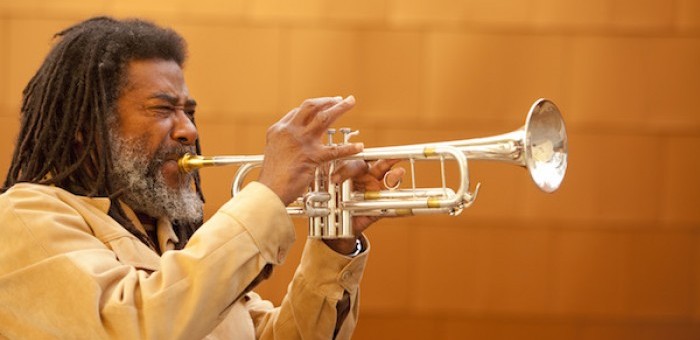Jan 13, 2026 2:09 PM
More Trump-Kennedy Center Cancellations
The fallout from the renaming of the John F. Kennedy Center for the Performing Arts to include President Donald…

Wadada Leo Smith’s improvisational chops weren’t properly utilized in this particular setting at Winter Jazzfest, writes critic Ken Micallef.
(Photo: Courtesy of the artist)Even on the surface, the lineup was at best quizzical.
The final night of Winter Jazzfest 2018 counted what was undoubtedly the most unusual bill of the weeklong event. Match regal trumpeter Wadada Leo Smith with San Francisco noise-pop merchants Deerhoof and wait, watch, and get out of the way. Without knowing the desired goal of this tag team match, it’s impossible to judge the performance by any usually applied concert review standards; suffice it to say that sparks flew, but no fire ensued.
Smith is a master of improvisation; his work with AACM, as well as his 50-plus albums as a leader, constitute one of the most revered discographies in jazz. His Miles Davis tribute albums (co-lead with Henry Kaiser), Yo, Miles!, Sky Garden and Upriver, are a good reference point for exploration and adventure.
At its best, Deerhoof recall a deranged blues-punk-pop ensemble, drawing from Captain Beefheart and His Magic Band, Japanese punk trio Shonen Knife and the spirit of the 1990s post-punk revival. The band produces plenty of jugular-ripping mayhem as vocalist/bassist Satomi Matsuzaki’s monosyllabic vocals are framed by the squealing guitars of John Dieterich and Ed Rodríguez, as well as the sweaty explosions of drummer Greg Saunier.
The band entered stage left, the announcer proclaiming, “Deerhoof!” Guess he didn’t notice the full-bearded man holding a trumpet on stage.
Playing to a feverish crowd, Deerhoof hit the stage like an exploding rocket, its punk-blues jumble open enough to express both note-packed fury and more elastic moments when Matsuzaki chirped lyrics over her primitive bass work. With the throttle occasionally pulled back, the guitarists momentarily yielded the floor. Smith blasted into the frame like white light, sometimes with reverb, sometimes with effects, but always with power, poise and streamlined intent. The sonic brew recalled Bitches Brew by way of Captain Beefheart’s Safe As Milk. Smith’s trumpet instantly shifted the balance of the music to where the idea of collaboration was cogent. Deerhoof listened, Smith tugged and teased, the music neared its apex. Deerhoof’s rare respites from total noise-punk allowed Smith to enter, serpentine-like, into the music’s rare calm over which he played skyward-leaping notes that scorched hot, then gracefully retreated. These small remarks revealed his beautiful sense of composition, tone and texture.
Smith is a master improviser, one who understands that there are moments to play, moments to listen and moments when those two concepts become one. Deerhoof, conversely, approached the performance largely with a winner-take-all attitude akin to “Hey Leo, we’re going to do our usual bashing—if you can find a hole to fill, have at it!”
Smith initially appeared game, but as the 60-minute set wore on, his facial expressions spelled out more befuddlement than amusement. He soon spent as much time sitting as standing. But Deerhoof raged. The crowd thinned. And the women sitting on the floor next to me spilled her pint on my shoes.
If Deerhoof understood the concept of group improvisation beyond raunchy, hair-flying guitar solos and manic drum bursts, perhaps they would’ve created space for Smith and backed off the punk-scrunch fever long enough to take a step into the unknown. But as Deerhoof’s skills were purely earth-bound, Smith was cast off to his own corner, alone, abandoned.
On its own, Deerhoof’s snappy vocals, clichéd blues guitar spiel and boisterous beats held an appeal like hard candy on a bad tooth. But as Smith looked to the band for direction, the musicians never met his gaze—and barely registered his presence. Mission aborted; experiment failed. DB

Belá Fleck during an interview with Fredrika Whitfield on CNN.
Jan 13, 2026 2:09 PM
The fallout from the renaming of the John F. Kennedy Center for the Performing Arts to include President Donald…

Peplowski first came to prominence in legacy swing bands, including the final iteration of the Benny Goodman Orchestra, before beginning a solo career in the late 1980s.
Feb 3, 2026 12:10 AM
Ken Peplowski, a clarinetist and tenor saxophonist who straddled the worlds of traditional and modern jazz, died Feb. 2…

The success of Oregon’s first album, 1971’s Music Of Another Present Era, allowed Towner to establish a solo career.
Jan 19, 2026 5:02 PM
Ralph Towner, a guitarist and composer who blended multiple genres, including jazz — and throughout them all remained…

Rico’s Anti-Microbial Instrument Swab
Jan 19, 2026 2:48 PM
With this year’s NAMM Show right around the corner, we can look forward to plenty of new and innovative instruments…

Richie Beirach was particularly renowned for his approach to chromatic harmony, which he used to improvise reharmonizations of originals and standards.
Jan 27, 2026 11:19 AM
Richie Beirach, a pianist and composer who channeled a knowledge of modern classical music into his jazz practice,…